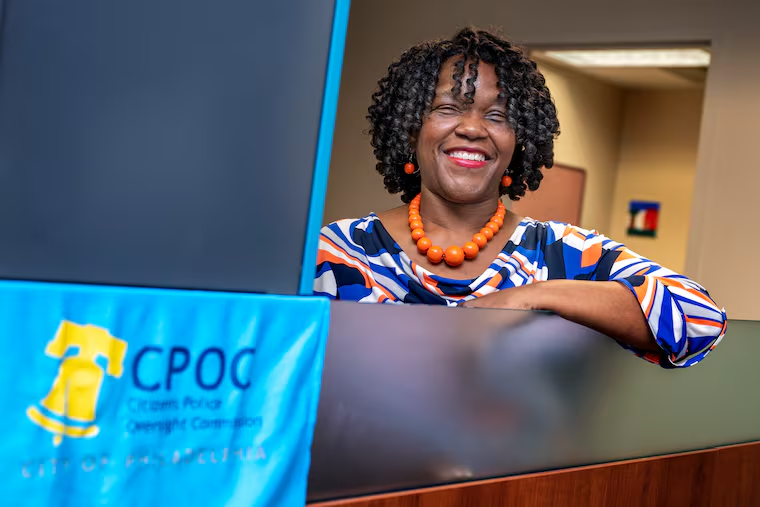Philadelphia needs to strengthen CPOC’s power to investigate police misconduct independently
The work of the Citizens Police Oversight Commission is too important to leave unfinished, writes CPOC director Tonya McClary.

In 2020, over half a million Philadelphians voted to create the Citizens Police Oversight Commission. The central power of this new agency would be to conduct independent officer misconduct investigations. City Council then passed legislation to carry out the voters’ will. The vision was clear: to empower CPOC to act as an independent body that can hold officers accountable for misconduct, and improve transparency in policing.
Currently, there are four sitting commissioners and a total of nine seats on the commission. The selection panel is actively conducting interviews to fill these vacancies. Similar commission structures exist in other cities like Washington, D.C., and at the national level.
While CPOC has made progress toward its vision, the police contract has been a barrier. Under the current police contract, the Fraternal Order of Police must approve, in writing, any disciplinary changes required to fulfill CPOC’s legislative mandate. Nationwide, police unions have opposed oversight reforms. No group volunteers for stricter supervision of its members. Now the city is about to negotiate its first new police contract with the FOP since CPOC’s creation. We can use this moment to make our mandate a reality.
The Philadelphia Home Rule Charter and Philadelphia Code grant CPOC the right to conduct independent investigations, but we don’t have the practical authority and the resources to fully realize our mission.
Currently, CPOC monitors police disciplinary processes through collaboration with the Philadelphia Police Department’s Internal Affairs Division. Our investigations division responds to the scene of every police shooting. The division also oversees certain investigations, attending interviews of both complainants and officers at IAD.
CPOC reviews discipline charges with the department’s Police Board of Inquiry charging captain when there are sustained misconduct findings in complaints against police. CPOC staff sit as voting members at every single officer discipline hearing. We collect and analyze data, make policy recommendations, and attend hundreds of community events a year.
We are proud of our work to perform these critical functions, but we know — and we have heard from the community — that they fall short of the independent oversight Philadelphia’s residents expect. Our role is not to monitor from the sidelines, but to serve as an active and independent body capable of investigating allegations of misconduct. This, we believe, is the path toward building public trust.
» READ MORE: The high cost of police misconduct | Editorial
The Philadelphia Code clearly states that CPOC shall investigate certain complaints against the police, but the current structure does not allow our investigators to operate independently from IAD. We cannot conduct thorough and impartial investigations. To fulfill our mandate, CPOC must be able to independently investigate, interviewing both complainants and officers independently, collecting evidence from both police and public sources, and reaching findings that will lead to officer discipline when there is misconduct.
The solution lies in the city’s negotiations with the police union. We need the city to push for changes in the collective bargaining agreement that will require officers to cooperate fully with CPOC’s independent investigations. We need the next contract to articulate CPOC’s investigative role in the police contract. Without these changes, accountability will remain within existing department structures, which Philadelphians overwhelmingly voted to reform.
In addition, CPOC needs adequate funding to carry out its expanded role. The investigations division consists of a small but talented team. Our work with IAD is limited by budget constraints, which impede our ability to act on behalf of the community. We believe that expanding CPOC’s ability to investigate independently will reduce costs elsewhere in city government by leading to more efficient handling of complaints and discipline.
» READ MORE: Police accountability is key to making Philly safer | Editorial
The work of the Citizens Police Oversight Commission is too important to leave unfinished. With changes to the contract, CPOC can fulfill its mandate and provide the transparency and accountability the people of Philadelphia deserve. Let’s finish what we started.
Please stand by my side at the FOP contract hearing on Thursday at 2 p.m. at City Hall. If you’re not able to attend, please contact your City Council member and share your support of CPOC and police oversight.
Tonya McClary is executive director of the Citizens Police Oversight Commission. McClary is an attorney and a pastor whose distinguished career includes extensive experience in criminal justice and civil rights.